Between the Anvil of Water and the Hammer of Spirituality
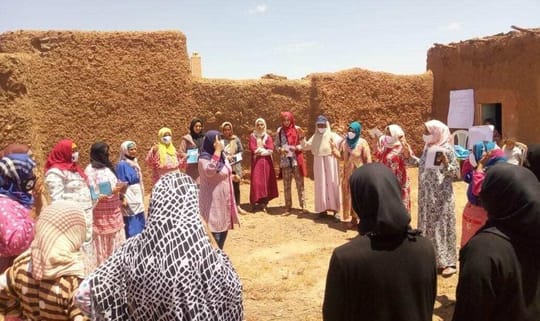
By Fatima Zahra Laaribi
HAF Program Manager

Twenty-three women from the village of El Kdirat in the Jnane Bouih commune of the Youssoufia province, participated in a four-day Imagine women’s empowerment workshop that took place between June 21-24. There are approximately 36 households in El Kdirat, the average size being between 6 to12 people.
There was a diversity in age among the women who attended this workshop, ranging from 14 to 64 years old. The community has two schools – one elementary school and one middle school – the nearest of which is three kilometers away. As a result, many of the women who participated in the workshop were unable to attend formal schooling.
This Imagine workshop was organized by the High Atlas Foundation (HAF), in partnership with the USAID Farmer-to-Farmer program and Germanwatch. It is an opportunity for the participants to envision new possibilities first for themselves as well as for their families so that they may enact change in their own communities.
The HAF team was greeted by a very warm welcome from the women of the village, who started off with an exhibition of their own traditions. Their strong ululations expressed happiness, and milk and dates were served outdoors before entering the venue of the workshop. This lovely atmosphere broke the ice before the start of day one.
This is the first time that HAF has conducted a workshop with a community belonging to the Ahmar tribe (Red tribe). The Awlad Ahmar tribe is famous for the presence of the famous Sufi shrine on its territory, that of Sidi Shiker, which is located near the road linking Shemaya and the city of Chichoua. It is also famous for the Mawlawi school, where the princes of the Alawite state used to study the military arts of equestrianism, archery, and more. It is said that Sidi Shiker is one of the owners of Uqba ibn Nafi al-Fihri, the great conqueror of the Maghreb. He grew ill when a caravan passed from Souss, and he died and was buried on the bank of Wadi Tensift. His mausoleum is considered one of the oldest shrines in Morocco since the Islamic conquest.
There is another shrine for a saint called Sidi Ahmed Moul Chahba, or Zaouiet Moul Chahba. Each summer the community organizes an annual festival that lasts three days from the evening of Thursday to Sunday.
The Imagine empowerment workshop spans four days and calls on women to review seven critical areas of their lives: emotions, relationships, sexuality, body, money, work, and spirituality.
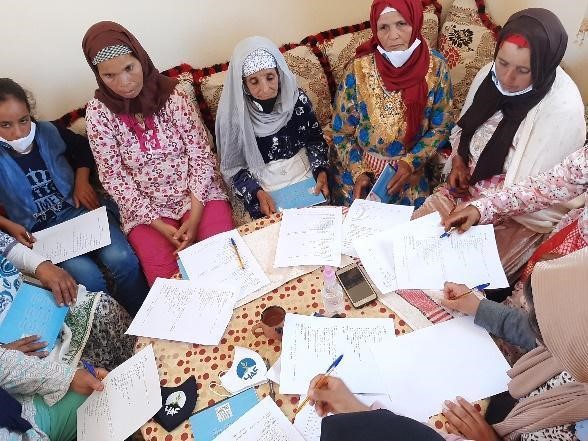
The four-day format has been carefully adapted to the local context so that each area is addressed with respect, compassion, and honesty. The facilitator tends to use vocabulary that is spoken in this area as well as some local proverbs and examples from their own culture to ensure they understand and identify with each area.
The women who participated reported that they were all experiencing some or many of these issues: no vision, no faith in themselves, stress, sexual harassment, speech problems, a sense of confusion or feeling overwhelmed, lack of confidence, powerlessness, and feelings of being stuck and disadvantaged.
First, women learned about the shift from pathology to vision. Essentially this concept says that where we place our mental attention is what grows. The simple metaphor of cultivating a garden is immediately grasped and deeply understood by all women in the workshops even though they are not formally educated. The idea of watering the seeds of your interior garden, not the weeds, means focusing on possibilities, not problems. Once introduced to this essential concept, the women became aware that they are responsible for their own thoughts. In the shift from pathology to vision, women also learned that without a compelling vision, naturally, their thoughts would focus on problems, fears, anger, and other negative things that are disempowering them.
The group then discussed the shift from static to organic. The idea of a growing edge was introduced to help them to understand that their life is not static or fixed in a specific state – but rather has organic movement. The main idea is that growth is still possible, and there is always hope for better change.
Next, the women focused on the integration of awareness and behavior change. In order to assist women in integrating awareness with desired outcomes, a simple four-step process is introduced that describes the process to behavior change.
Step One—Awareness: Where am I now?
Step Two—Vision: Where do I want to go?
Step Three—Transformation: What do I need to change to get there?
Step Four—Growth: What is my next growth step?
After understanding the empowerment framework, they went through the inner soil test, where they think about their core beliefs and values as they relate to self-responsibility, self-esteem, trust, positivity, and change. In this session, the facilitator gave them concrete examples from her own life as well as local examples.
In the area of emotions and relationships, the participants enjoyed the exercise of personal power, called the Rooms exercise, and several participants were invited to share their unique perspectives. Through this mediation exercise, participants discovered their strengths and developed a deeper understanding of their personal sources of power. Despite many of the participants being unable to read, they participated fully in this meditative exercise with great depth, drawing pictures showing what they discovered.
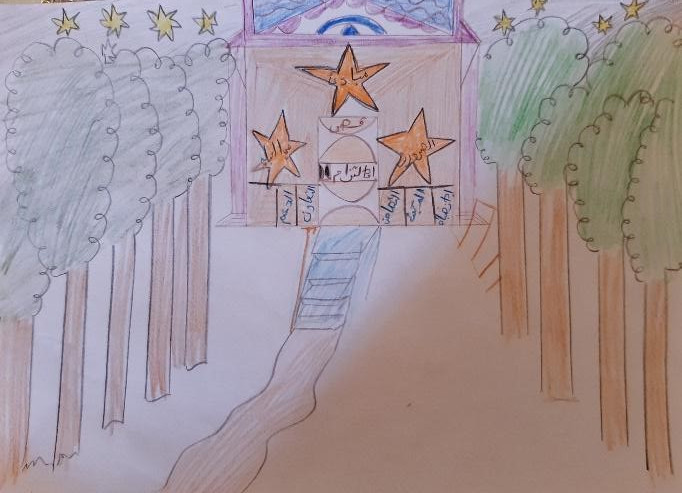

The women expressed happiness in particular with the guided meditation aspects of the program. Meditation is an integral part of Islam, believed to open the door to revelation and to be an essential aspect of spiritual development. Through the guided visualizations, they expressed their visions, innovations, and creativity. For most, this was the first opportunity to clearly visualize their capacity to change their own lives and to improve their community. They understood that they do not need formal education in order to create and implement their visions.
One participant, Nadia, is a thirty-seven-year-old woman who was born and raised in Marrakech and married in a very remote area. During the meditative exercise, Nadia expressed that she had fought a long internal and psychological battle in order to overcome and adapt to this major change in lifestyle – from urban to rural. On the second day of the workshop, she shared what she learned with her husband and called her sisters in the city to share with them what she learned as well.
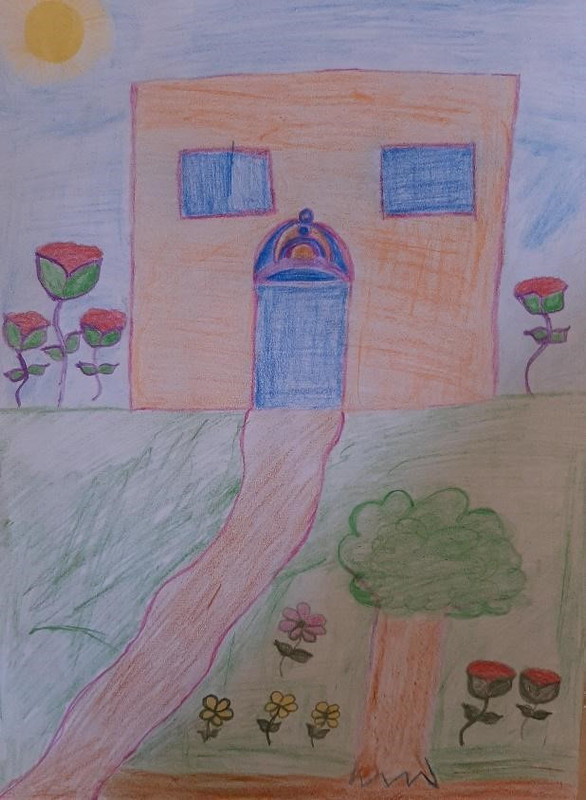
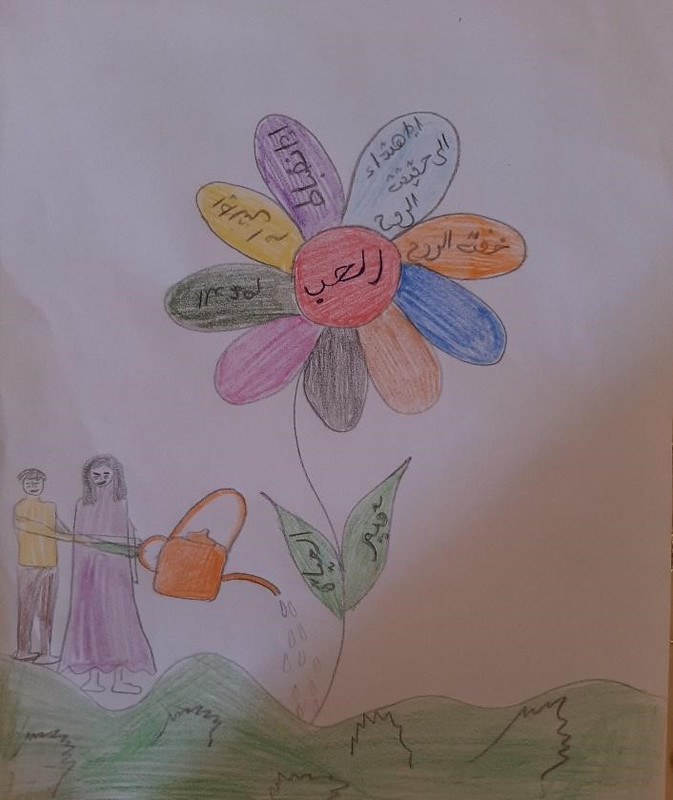
For many of the women, this workshop was also the first opportunity for them to speak about their bodies. The Body Dialogue exercise consists of several questions that help them easily explore their limiting beliefs in the area of the body and turn it around to positive intention or affirmation.
In discussing work, the women expressed that they see themselves working with each other as well as on their own in managing a business. The most common vision expressed was to work outdoors with each other in a large green space with a well, where everyone can have sustainable access to clean drinking water, pumped by a clean energy source. They spoke a lot about money as the area of work is closely connected to money. This common vision led the group to speak about work that is formed by individuals who coordinate among themselves to achieve their goals. Establishing a cooperative is an example of this, and, therefore, HAF facilitators explained cooperatives and how they operate.
The women liked the idea of forming a cooperative, so the discussion turned to the legal regulations and procedures of establishing cooperatives and their various types. The women of El Kdirate village dreamed of establishing an agriculture cooperative that fit their skills.
On the following day, the women came in with four offers of land to concretize their work vision. They were able to put their thoughts into action, which is a big step forward. Furthermore, they shared that they will be attending the literacy program that was launched last February. Unfortunately, only five women were able to attend it.
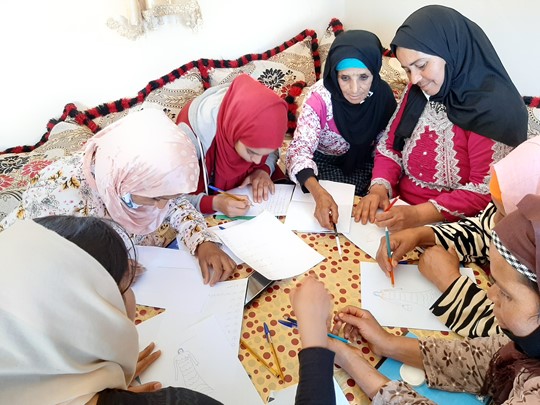
In the area of spirituality, more than 90% of the participants dreamed of building a place where women can pray. Currently, there is only a prayer space for men available.
At the end of the workshop, most of the women affirmed that they will work on their personal growth and insist on their common vision. They will work together to build green space with a well, integrated with a renewable energy system, and a place where they can pray.
HAF and its partners will accompany these women and help them achieve their highest goals, which is still standing between the anvil of drinking water and the hammer of building a place where they can accomplish their spiritual practices.
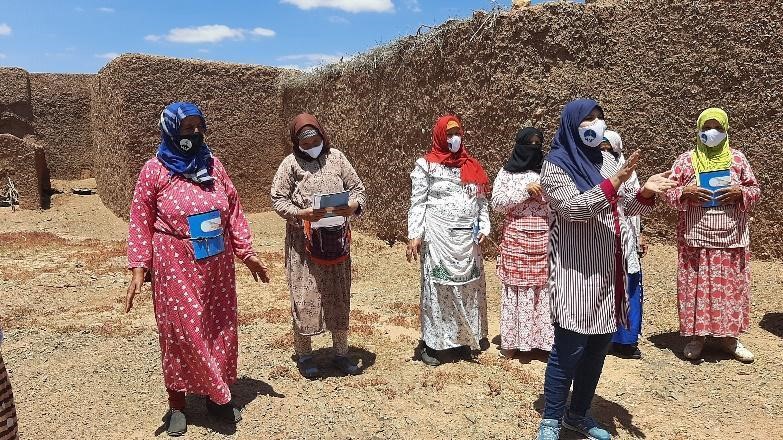
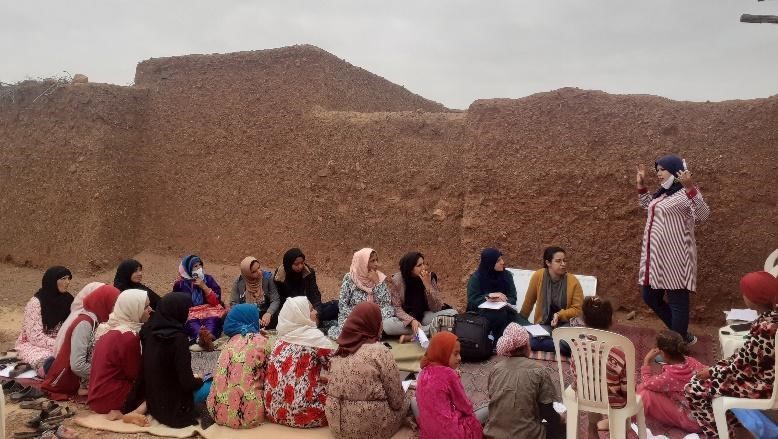
Fatima Zahra Laaribi is the Lead Imagine Empowerment Trainer for the High Atlas Foundation in Morocco. Since 2016, the Imagine program has reached 922 participants, 253 of them youth, in the provinces of Marrakech, Al Haouz, Azilal, Boujdour, Essaouira, Mohammedia, Oujda, Taroudant, Magouna, Sefrou and Youssoufia.